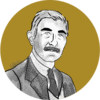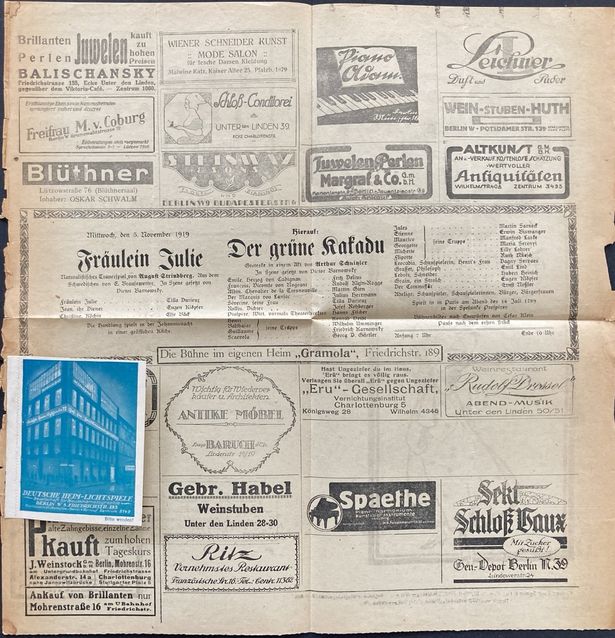Vienna, 21 January 1935
The Art of Comedy
A portrait of the Viennese audience favourite Josef Rehberger by Alexandra Mae Hiebert
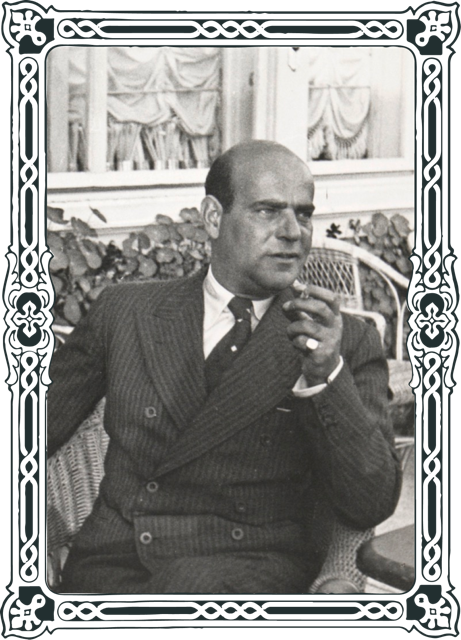
© KHM-Museumsverband
An Audience Favourite
The talented and versatile Josef Rehberger captivates the audience with his acting skills as soon as he appears on stage. In Vienna, his name is synonymous with comedy. He is not only a highly regarded member of the Deutsches Volkstheater but also possesses an extraordinary talent for portraying people on stage with remarkable authenticity. Whether on the big screen in cinema or on the theatre stage, Josef Rehberger excels at bringing laughter to his audience.
A Comedic Talent
Josef Rehberger has been working as an actor for more than twenty years. Thus, it is impossible to imagine the European stages without him. As he revealed in an interview with the Neues Wiener Journal, he owed his artistic breakthrough to Rolf Jahn, the director of the Deutsches Volkstheater. His acting career began in 1909 at the Royal Municipal Theatre in Olomouc. In front of a sold-out house, he first appeared on stage as the Shepherd in a production of Tristan and Isolde. In addition to this musical drama, he also showed his skills in the comedies Die verflixten Frauenzimmer (‘The Darn Women’s Rooms’) and Der Komtesse Mizzi (‘The Countess Mizzi’). In Baden near Vienna, he made countless people laugh with his performances in the following years. Whether in leading roles, such as Emil Holler in Ernst Gettke’s and Viktor Leon’s farce Der Detektiv (‘The Detective’), or in a supporting role in Viktor Leon’s and Leo Feld’s comedy Der Große Name (‘The Big Name’). He proved his versatility and musical talent not only in countless performances in comedies but also in a large number of operettas. He demonstrated his talent to both the world metropolis of Vienna and also to the theatre city of Berlin. From 1919 to 1923, he performed in Berlin at the Lessing Theater in plays such as Der grüne Kakadu (‘The Green Cockatoo’) and Robert Frank. The longing for his home country drove him back to Vienna. Immediately after his return, he appeared at the Ronacher Theater in the revue Wien gibt acht! (‘Vienna Pay Attention!’) Finally, he found his lasting artistic home at the Deutsches Volkstheater in Vienna.
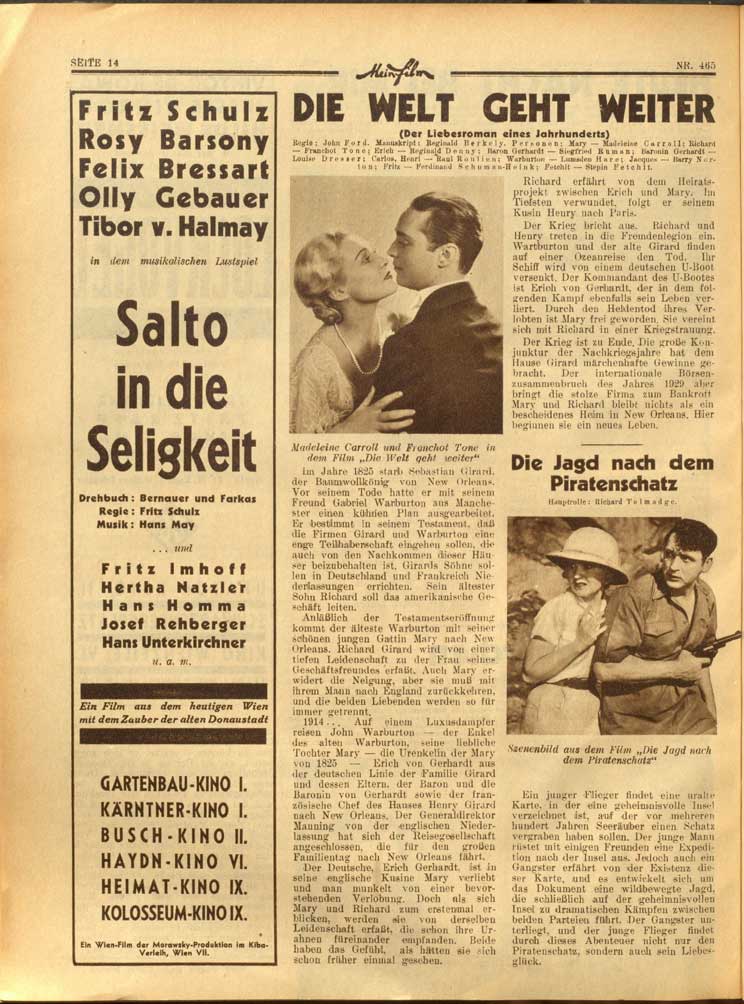
Source: ANNO/Austrian National Library
From the Stage to the Big Screen
Josef Rehberger’s talent, however, can not only be admired on Viennese stages, but also on the city’s cinema screens. It is possible to see the actor alongside Fritz Schulz and Rosy Barsony in Rudolf Bernauer’s and Karl Farkas’ musical comedy Salto in die Seligkeit (‘Leap into Bliss’). In this comedy Rehberger plays the role of the business manager Mr. Braun. Our readers are cordially invited to visit not only the auditorium of the Deutsches Volkstheater, but also the movie halls of the Gartenbau Kino or the Kärntner Kino to marvel at Josef Rehberger’s artistic finesse away from the theatrical stage.
‘He understood [...] how to awaken the eternal in mankind through his art.’
n
Rabbi Dr Taubes, eulogy for Josef Rehberger, 1942
Josef Rehberger
born 8 February 1889, Vienna
died 20 April 1942, Zurich
Biography
Josef Rehberger was born on 8 February 1889, in Vienna, the youngest of eighteen children. In order to financially support his parents, Jakob Rehberger (1846–1926) and Marie (née Schmidek, 1846–1925), he worked from a young age. It so happens that he has been a part of the theatre since childhood. As the actor said about himself in an interview with the Neues Wiener Journal, his theatre career began in the auditorium: ‘[I] began in the gallery and not on the stage, and that was at the age of eight in the Theater in der Josefstadt [...]. My role had five words: fresh water, bakery, ham sandwich.’ His employment came to an end with the change of director from Ignaz Wild (1849–1909) to Josef Jarno (1865–1932). As Rehberger himself said, it was ‘a heavy blow for me and my parents’. The next step in his career was the beginning of an apprenticeship with a watchmaker, which he completed ‘dutifully and diligently’. His love for the theatre, however, was strong: ‘At the age of sixteen, I eloped and went to the stage.’
g
In the following years Josef Rehberger travelled through the Habsburg monarchy. His acting career began in 1909 at the Olmütz City Theatre. From there, he travelled via Baden, near Vienna, to Frankfurt am Main, Salzburg, and finally to Marburg an der Drau, where he was finally discovered. He then returned to Vienna. For the next six years he was part of the ensemble of Alfred Bernau (1879–1950) at the Deutsches Volkstheater in Vienna. He married the actress Bertha Julianna Windhopp (1892–1975) on 16 January, 1915. From 1919 to 1923 Rehberger was active as an actor in Berlin. There he played among others under Max Reinhardt (1873–1943) at the Deutsches Theater. Back in Vienna, he worked at the Ronacher Theater, Raimund Theater and Burgtheater until 1928, when he became part of the ensemble under Rolf Jahn (1898–1968) at the Deutsches Volkstheater in Vienna. His marriage to Bertha Windhopp ended in 1930, and his second wedding, on 21 January 1931, was to the actress Mary Schnabl (1906–year of death unknown). They divorced six years later.
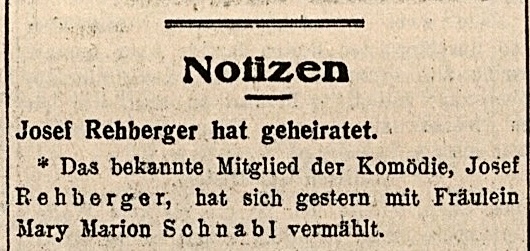
Source: ANNO/Austrian National Library
At this time Josef Rehberger played himself ‘into the first row of Viennese actors’ and could not only be seen on stage but also on the big screen. For example, he played in Fritz Schulz’s (1896–1972) 1934 musical comedy Salto in die Seligkeit (‘Leap into Bliss’). He made his last theatrical appearance in Vienna on 5 March 1938. In 1939, Josef Rehberger left his apartment at Himmelpfortgasse 2 in Vienna’s 1st district and fled to Switzerland. There, on 11 June 1941, he appeared on stage again at a musical-literary evening organized by Gisela Smetana (1873–1941). He partook in the performance of the comedy Der Selige (‘The Blessed’) by Hermann Bahr (1863–1934) and he ‘[gave] the figure of a guileless bigamist the light and colour of an irresistible comedy’. Josef Rehberger died in Zurich on 20 April 1942.
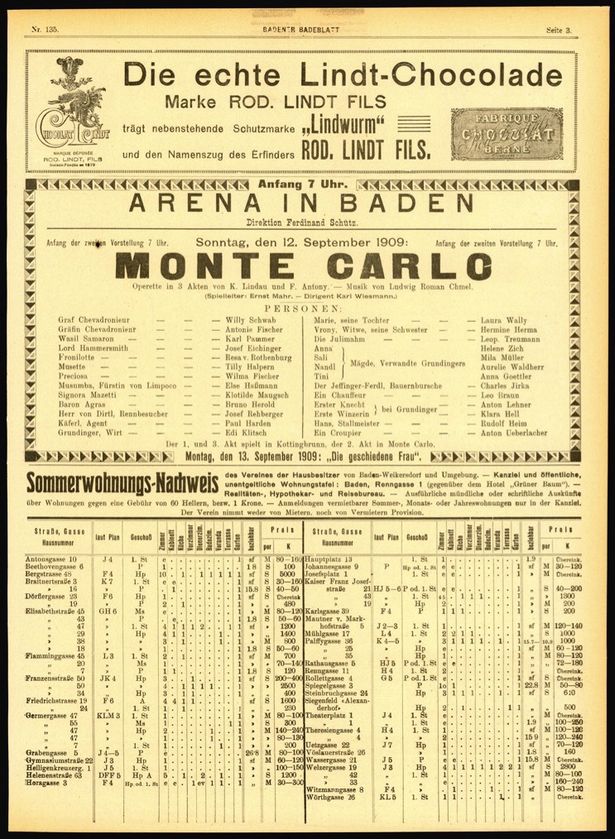
Source: ANNO/Austrian National Library
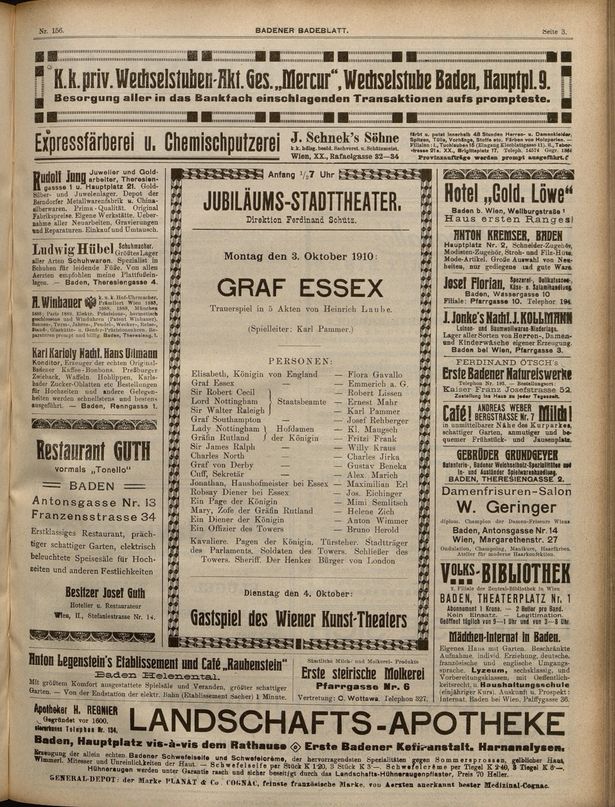
Source: ANNO/Austrian National Library
What remains?
k
The memory of Josef Rehberger no longer exists. With the Anschluss in Austria, his name, his artistic work, and his talent were not only removed from the Viennese newspapers, but also from the everyday cultural discourse.
After 12 March 1938, Josef Rehberger’s life is a gaping void, which has not been filled to this day. Only a few days before, he performed on stage and made the audience laugh. On 3 March, 1938, Der Wiener Tag reported on the premiere of the play Das Haus Romanow (‘The House Romanov’) at the Deutsches Volkstheater. In it Rehberger played the Grand Duke Sergei. One day later, his name appeared in Die kleine Volkszeitung. Josef Rehberger was mentioned for the last time in a Viennese daily paper on 6 March 1938.
g
The composer and librettist Hugo Wiener (1904–1993) recalled what his last days in Vienna were like:
‘Once, as I was passing by the Secession, I saw the well-known actor of the Volkstheater, Josef Rehberger, kneeling on the ground and trying to scratch away the Kruckenkreuz.’
He went on to say that the humiliation did not end there. In addition to these inhumane harassments, bystanders also took pleasure in degrading him. In 1939 he managed to escape to Switzerland.
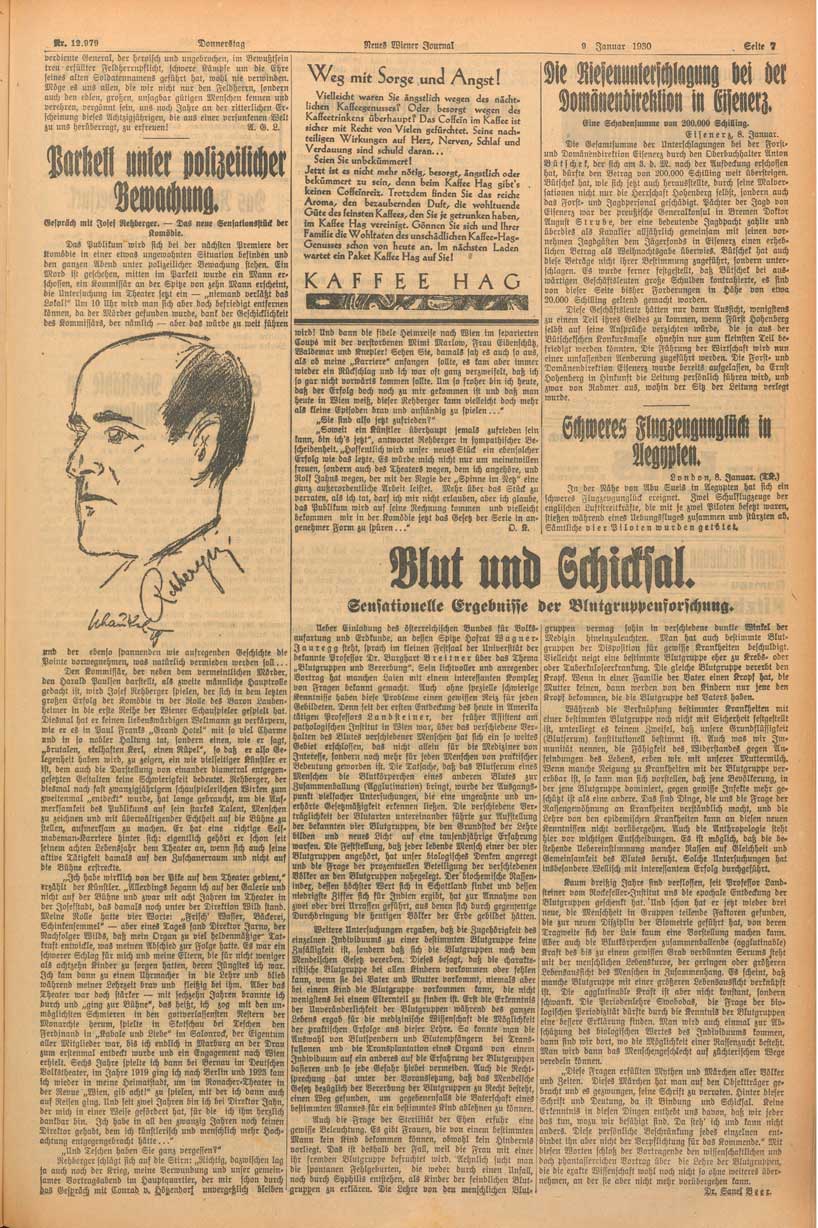
Source: ANNO/Austrian National Library
With his absence from Vienna and from the theatre stage, the laughter provoked by his artistic talent, which had thrilled the Viennese audience every evening anew, went silent. As the Swiss Rabbi Chaim Zwi Taubes (1900–1966) recalled in the Israelitisches Wochenblatt,
‘[h]is life was consecrated to art, and it may well have contributed to his end that he was no longer able to pursue his profession, to which he was passionately attached.’
On 20 April 1942, Josef Rehberger died in Zurich after many years of lung disease. The Austrian actor Eugen Jensen (1871–1957) commemorated him in the Israelitisches Wochenblatt as ‘a victim of his time.’
